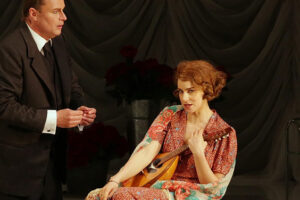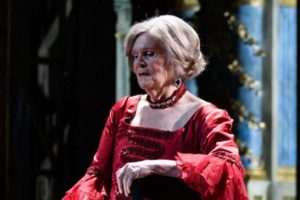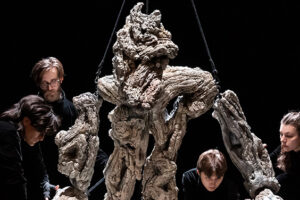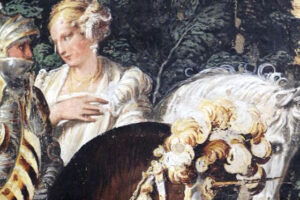

Vittorio Grigolo in the title role of the Met’s revival of Les Contes d’Hoffman is the opera version of that charming homeless drunk. The Bartlett Sher production is hopeless—dreary and vulgar at the same time. Grigolo pretty much ignores Sher’s existential Kafka-esque “vision” and does his own singing and dancing vaudeville act.
You hear how his lower register is sort of garbled and swallowed, and that he includes too many veristic effects to be “idiomatic” for French opera, and he holds onto his high notes in a way that’s not very musical, but nearly all is forgiven when he jumps around the stage like a little frog in the Vittorio Grigolo Show. It’s not exactly Offenbach, but it is fun. And the Met’s Les Contes d’Hoffman is such an old-fashioned, corrupt version anyway, so who really cares about authenticity?
Grigolo’s cheerful manic energy was a stark contrast to Thomas Hampson (Four Villains). Most singers go to town on this role, camping it up any way they can with surreal, flamboyant, mustache-twirling antics. Hampson missed that memo and sang the whole thing like a lieder recital.
He eschewed any form-changing make-up to differentiate between Lindorf, Dr. Coppélius, Dr. Miracle and Dapertutto. He adopted the dignified formal art song posture and lieder mannerism of sing-speaking.. He even had the poofed baritone hair and sideburns. It was dreadful. I can forgive the fact that his voice doesn’t have much resonance anymore and sounds dry and worn, but I can’t forgive the fact that he was so damned tedious.
The women were okay to very good. Least impressive was Christine Rice (Giulietta). She’s not old, but she has an old voice—throaty and matronly, the type of sound that totally disappears in ensembles and was barely present in the “Barcarolle.” Her portrayal of the seductive courtesan was also matronly. The Marie Antoinette get-up didn’t help but neither did her stand-and-sing style.
She was totally overshadowed by the striking performance of Kate Lindsey (Muse/Nicklausse), who’s a dead ringer for Lizzy Caplan (Masters of Sex) and has a nice plummy mezzo. Lindsey was a real scene-stealer. The Violin Aria was a vocal highlight.
It was harder for Lindsey to steal the thunder from Erin Morley’s Olympia. For me the younger Natalie Dessay will always be the standard Olympia by which I judge others, but Morley’s smaller, less penetrating, but pleasant voice sailed through “Les oesiaux dans la chamille” with plenty of acuti thrown in including a squeaker of a final note. Cute. I look forward to hearing more things from her.
Hibla Gerzmava (Antonia) was the opposite of Lindsey and Morley—she’s obviously of a certain age and not exactly exciting to watch. Her voice sometimes resembles Anna Netrebko’s, and not necessarily in a good way. She has the same dark, rich timbre, but also Netrebko’s potato mouth and rhythmic slackness. But it’s a large, well-produced voice with a very impressive upper register. She expires on a full-throated trill.
Yves Abel led a spirited, lively rendition in the pit that was only occasionally coordinated with the soloists and chorus. At least he wasn’t tedious.
At the end of the evening Vittorio put on the Show After the Show. Of course he burst out from the wings, and leapfrogged to downstage center for his curtain calls. (No dignified slow walk for him.) He was so overcome by the applause that he knelt, put his hands on the stage, and leaned down to kiss it as if he were Licia Albanese reincarnated.
Of course he was pelted with bouquets, which he caressed without offering any of his leading ladies so much as a measly petal. After kissing the stage he did the thing where he reaches into his jacket to “pull out his heart” and then ended the show by “throwing his heart into the audience”.
A wise man once said: “It’s absurd to divide people into good and bad. People are either charming or tedious.” Vittorio Grigolo may be a narcissist, but at least he’s a charming one.
Photo: Marty Sohl/Metropolitan Opera
-
Topics: bartlett sher, review, the Met, thomas hampson, vittorio grigolo
MET Opera Legend Leona Mitchell Live in Concert
Leona Mitchell, the MET Opera’s leading Verdi soprano for 18 seasons, is returning to the stage April 19th in New York City. Get Tickets →
Leona Mitchell, the MET Opera’s leading Verdi soprano for 18 seasons, is returning to the stage April 19th in New York City. Get Tickets →
parterre in your box?
Get our free weekly newsletter delivered to your email.
























Comments